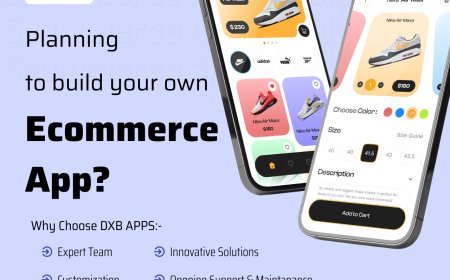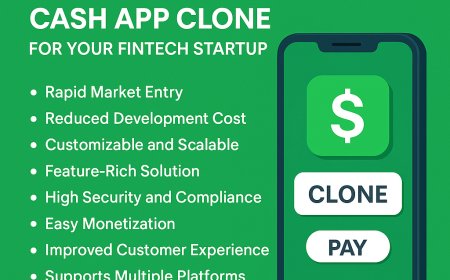What’s the Difference Between Native and Hybrid Apps?
Looking for expert mobile app developers in Dubai? Devherds builds custom Android, iOS, and cross-platform apps that drive results.

In todays digital-first world, mobile apps have become the core of customer engagement, digital operations, and modern marketing strategies. Businesses aiming to deliver seamless user experiences must first decide what kind of mobile app suits their objectivesnative or hybrid. Both approaches have their own strengths and use cases, but understanding the key differences is essential for making the right choice.
In this comprehensive guide, well break down the main differences between native and hybrid apps, explore their pros and cons, and help you choose the right solution. If you're searching for a mobile app development services in Dubai, Devherds stands out as a leader in delivering both native and hybrid mobile app solutions tailored to your business needs.
Understanding Native Apps
Native apps are mobile applications developed specifically for a particular operating systemeither iOS or Androidusing platform-specific programming languages. For iOS, native apps are usually built with Swift or Objective-C, while for Android, Java or Kotlin is used.
Key Features of Native Apps:
-
Built specifically for a single platform
-
Developed using platform-specific SDKs (Software Development Kits)
-
Optimized for performance and device integration
-
Can access hardware features like GPS, camera, and microphone directly
Advantages of Native Apps:
-
High Performance: Native apps offer faster load times and smoother user experiences because they are compiled specifically for the platform.
-
Better UI/UX: Developers can use the platforms native UI components, ensuring a more intuitive and responsive user interface.
-
Full Device Integration: Native apps have access to all device APIs, sensors, and features.
-
Offline Functionality: They work well even without an internet connection.
Disadvantages of Native Apps:
-
Higher Development Costs: Separate codebases for iOS and Android mean more development time and cost.
-
Longer Development Time: Building two different versions of an app takes more time.
-
Maintenance Complexity: Updates need to be made individually on both platforms.
Understanding Hybrid Apps
Hybrid apps are a mix of web and native apps. They are built using web technologies like HTML5, CSS, and JavaScript, and then wrapped in a native container that allows them to be deployed across multiple platforms from a single codebase.
Key Features of Hybrid Apps:
-
Single codebase across platforms
-
Use of web technologies
-
Wrapped in a native container like Cordova or Capacitor
-
Easier cross-platform deployment
Advantages of Hybrid Apps:
-
Faster Development: A single codebase speeds up development.
-
Cost-Effective: Lower development and maintenance costs compared to native apps.
-
Wider Reach: A hybrid app works on both Android and iOS, maximizing user base.
-
Quick Updates: Changes can be pushed instantly using web technologies.
Disadvantages of Hybrid Apps:
-
Limited Device Access: They may not access all native features or may require plugins.
-
Performance Issues: Hybrid apps may lag in performance compared to native apps, especially with complex functionalities.
-
Design Limitations: Achieving platform-specific user interface design can be challenging.
-
Dependency on Third-Party Plugins: For many native functions, hybrid apps rely on third-party plugins, which can be unreliable or outdated.
Native vs Hybrid: A Side-by-Side Comparison
| Feature | Native Apps | Hybrid Apps |
|---|---|---|
| Platform Specificity | Built for one platform | Cross-platform |
| Performance | High | Moderate |
| Development Cost | High | Low to Medium |
| Time to Market | Longer | Faster |
| User Experience | Excellent | Moderate |
| Access to Device Features | Full access | Limited or plugin-based |
| Maintenance | Complex | Easier |
Which One Should You Choose?
The choice between native and hybrid apps depends on several factors:
1. Budget
If you have a limited budget and need an app on both iOS and Android, hybrid apps are a more economical choice. Native apps require separate development efforts, which can be expensive.
2. Timeline
Need to launch quickly? Hybrid apps take less time to develop. A single team can handle the entire app using one codebase.
3. User Experience
If your app requires a superior UI/UX, such as gaming apps or performance-intensive applications, native is the way to go. Native apps ensure faster, more responsive experiences.
4. App Complexity
For apps requiring deep integration with hardware or running intensive processes, native apps are ideal. Hybrid apps may struggle with performance in these scenarios.
5. Maintenance and Updates
Hybrid apps are easier to maintain. A single update can be pushed to all platforms. Native apps require individual updates per platform.
Why Choose Devherds as Your Mobile App Development Partner?
Choosing the right mobile app development company in Dubai can make or break your apps success. Devherds brings a decade of experience in crafting scalable, high-performing native and hybrid apps for startups, SMEs, and enterprises across various industries.
Heres what makes Devherds the right choice:
-
Expertise in Both Native and Hybrid Technologies: Our team has deep knowledge of Swift, Kotlin, React Native, Flutter, and more.
-
Customized Development: We understand that one-size doesnt fit all. We tailor every app according to your business goals and user preferences.
-
UI/UX Excellence: We focus on delivering beautiful and functional user experiences.
-
Cost-Effective Solutions: Get the best value for your investment, whether you go native or hybrid.
-
Ongoing Support & Maintenance: From updates to debugging, we offer continuous support post-launch.
Real-World Use Cases
Native App Success: Healthcare Monitoring
A Dubai-based healthcare startup approached Devherds for a native Android and iOS solution to manage remote patient monitoring. Given the performance requirements and device integrations (wearables, sensors), a native solution was best. The result? A 40% increase in app usage and higher patient engagement.
Hybrid App Success: E-Commerce Platform
A retail brand in Dubai wanted to launch an e-commerce app fast and cost-effectively. Devherds built a hybrid app using Flutter, enabling cross-platform deployment with a consistent UI. The brand saw a 3x increase in mobile orders within three months.
Final Thoughts
Both native and hybrid apps serve valuable purposes, depending on your business needs, budget, and desired user experience. Native apps deliver superior performance and deep device integration, ideal for complex applications. Hybrid apps offer faster time-to-market and cost savings, great for MVPs and content-focused apps.
If youre still uncertain which path to take, consulting a professional mobile app development company in Dubai like Devherds can help guide your decision. With a proven track record of successful native and hybrid applications, Devherds ensures that your mobile app isnt just functionalbut also strategic, scalable, and future-ready.
























